
If you’ve ever wanted to know what the United States would look like if the liberals won every single election for next several decades, all you have to do is look at the political and economic cesspool that is Venezuela. The country is growing worse and worse with each passing month – in fact, it’s so bad right now that the Venezuelan people are being forced to loot and scavenge for food just so that they don’t go hungry.
As the Associated Press wrote in a recent article titled “Venezuelans loot to eat amid economic tailspin,” Carlos Del Pino, who has hauled cargo in Venezuela for 14 years earning no more than $100 per month, witnessed “20 people swarm a truck ahead of him and in a frenzy fill up their sacks with the corn it was carrying to a food-processing plant. The driver was held at gunpoint.” The event allegedly took place near the docks of Puerto Cabello, Venezuela’s largest port.
“It fills you with terror,” Del Pino told the Associated Press, adding that the people of Venezuela “have to loot to eat.” (Related: Venezuelan doctors and teachers are becoming prostitutes to earn enough money to buy food.)
Many of the people in Venezuela rightfully blame President Nicholas Maduro for the country’s problems, and in recent months, there have been numerous political demonstrations trying to oust him. “These protests are coming from people of the lower classes who simply cannot get enough to eat,” explained David Smilde, a senior fellow at the Washington Office on Latin America, who has also spent decades in Venezuela conducting research. “They want relief, not necessarily to force Maduro from power.” (Related: Venezuelan children are starving to death as food must now be delivered under armed guard.)
Unfortunately for the people of Venezuela, relief is unlikely to come until Maduro is removed from power, which probably isn’t going to happen anytime soon. But as horrible as President Maduro is to his own citizens, he does provide one very significant advantage to the American people: He has taught us exactly what type of policies and governmental strategies to avoid at all costs.
In an ideal world, every single politician in Washington D.C. would look at Venezuela, read about the riots that are taking place there, educate themselves on what people are being forced to do just to eat a meal, and come to the conclusion that more government is not the answer. Then, in order to steer America down a different, more prosperous path, these politicians would do the exact opposite of what President Maduro has done to his own country – that is, allow people to keep most of what they earn, and generally get government out of the way.
Again, this is what would happen in an ideal world. Unfortunately, Washington D.C. is full of politicians that just don’t get it. Just last year, we finally got through with eight long years of Barack Obama, a radical leftist who believed strongly in more government intervention in the economy. Thankfully, we now have a leader who understands that capitalism is how a country grows an economy – and in the one year that President Trump has been in office, that’s exactly what has happened.
Just last month, for instance, Apple announced that it plans to invest more than $30 billion in capital expenditures in the United States over the course of five years. Additionally, the company will be building a new campus in the U.S. and adding 20,000 more employees on top of the 84,000 people that already work for Apple. The company estimates that their contributions to America’s economy over this five year period will surpass $350 billion.
This is how societies create wealth and prosperity for all of its people. If the people of Venezuela want to revive their economy, then they would be advocating the same free market principles that President Trump has begun to implement in the United States.
Sources include:
Please contact us for more information.





















